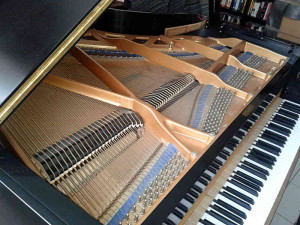Staying in tune

Count the strings – one per note in the bass, two per note in the tenor, and three for the rest!
All pianos naturally go out of tune. This is mainly due to a swelling and contracting of the different parts of the piano as they respond to changes in humidity and temperature. It ‘breathes’, and over time this unbalances the tension on the strings, pushing them out of tune.
How can I tell if my piano is out of tune?
At first, the change in the tuning of your piano may be slight and can be described as a minor ‘unfocusing’ of the sound of individual notes. You may also find that intervals such as fifths or octaves start to sound less sweet. As the changes build up, chords start to sound dissonant and the pitch stops matching across different sections of the piano’s keyboard. The overall pitch of the piano will also start to drop, making it difficult to play with other instruments or with recordings.
How can I keep my piano in tune?
How long a piano stays in tune depends on the stability of conditions in the piano room, and the age and condition of the piano. An older piano is likely to go out of tune quicker than a newer one. A piano near a radiator, a draught, or a source of moisture such as the kitchen or bathroom will suffer greater changes in temperature and humidity, and so go out of tune quicker.
The importance of regular tuning
The most important thing for tuning stability is regular piano tuning. If your piano is tuned once or twice a year or more, then the string tension will be a lot more stable throughout the year, and it will start to go out of tune a lot less between tunings. Book a tuning today and my regular reminders will help maintain this regular tuning schedule.
Wear and aging
Keyboard and action regulation
Over time, compression and wear will make your piano more difficult to play with control and expression.
- It can become hard to play quietly, evenly or quickly.
- Some notes can tend to ‘ghost’ where they don’t sound at all unless played firmly, or they can double strike, bouncing against the strings instead of just hitting them once.
- The keyboard can feel uneven under your fingers, with a loose or spongy feel.
- The keyboard might feel too heavy or too light.
These can be corrected by regulating the positions and alignments of all the moving parts. This will ensure the hammers respond correctly and evenly to the movement of the keys.
Voicing
The tone of your piano can also change over time, and you might find it unsuitable for the room it’s in.
- A very bright sounding piano can be very tiring to play
- A very mellow sounding piano can lack projection
- There should be good contrast between quiet and loud playing. Quieter should also be softer; louder should also be brighter
- Neighbouring notes should sound the same with none sticking out
With careful manipulation of hammer felt these tonal problems can be improved, the tonal palette broadened, and any unevenness ironed out. This process is called voicing.
It is through regulation and voicing that the full musical qualities of your piano can be discovered. Add a servicing package when you book an appointment, or contact me below to discuss your requirements.
